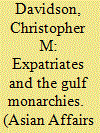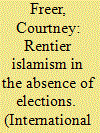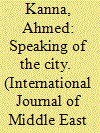| Srl | Item |
| 1 |
ID:
132345


|
|
|
|
|
| Publication |
2014.
|
| Summary/Abstract |
For many years huge expatriate populations have played a much documented role in the economic development of the Gulf monarchies. But a less well-told story is how expatriates have also contributed to their political stability. As non-citizens their presence in such large numbers has reinforced the elite status of most citizens in the region - an important non-pecuniary legitimacy resource for the various ruling dynasties. Moreover, the primarily employment-driven status of expatriates has meant that they have usually adopted either an apolitical or even prostatus quo stance. In some cases their perceived loyalty has led to selective naturalization or even direct co-option into security services. Disrupting this decades-old relationship, however, have been the recently changing political and economic circumstances of the Gulf monarchies. Already decisions have been made to reduce significantly expatriate populations due to accumulating pressures. Such measures are likely to threaten the historic political advantages the presence of expatriates has provided for these polities.
|
|
|
|
|
|
|
|
|
|
|
|
|
|
|
|
| 2 |
ID:
121061


|
|
|
|
|
| Publication |
2013.
|
| Summary/Abstract |
The Arab Spring did not turn everything vis-a-vis Gulf politics upside down, but the post-Arab spring politics seems to provide a fundamental component for change in nature of India-GCC relations. Primarily, there are profound shifts in GCC countries' foreign policy making in the post-Arab spring period. The event, of course, has brought a likelihood of a post-American phase in the external policy formulation. This shift is more explicit in Qatar's case as the country is making concerted moves to come closer to the champions of post-Arab spring regional politics-Egypt and Turkey. India and China appear to be the major potential beneficiaries of the emerging situation.
|
|
|
|
|
|
|
|
|
|
|
|
|
|
|
|
| 3 |
ID:
154660


|
|
|
|
|
| Summary/Abstract |
Drawing on contemporary history and empirical research, this article revises traditional rentier state theory, which fails to account for the existence of Islamist movements in states accruing substantial outside wealth. Rentier state theory expects that citizens of such states will form opposition blocs only when their stake in rent income is threatened. Examining the development of Muslim Brotherhood affiliates in two archetypal rentier states, or super-rentiers, in the Gulf—Qatar and the United Arab Emirates—this article shows that ideology rather than rent motivated the formation of independent Islamist movements. This research helps to break the causal link established by rentier state theory between oil rents and lack of politically relevant Islamist organizations. We find that the presence of oil rents, instead of rendering Islamist complaint politically irrelevant, shapes the ways in which Islamist movements seek to influence government policies.
|
|
|
|
|
|
|
|
|
|
|
|
|
|
|
|
| 4 |
ID:
131546


|
|
|
|
|
| Publication |
2014.
|
| Summary/Abstract |
The Arab Gulf remains a marginalized, even unfashionable, area of research in the Middle East academy. In spite of-or maybe because of-this marginality, the region offers an interesting vantage point for reflecting on the production of knowledge about geographic and cultural regions. The frame of knowledge production casts into relief discourses of "the city" in Middle East, and particularly Gulf, studies over the past decade.
|
|
|
|
|
|
|
|
|
|
|
|
|
|
|
|